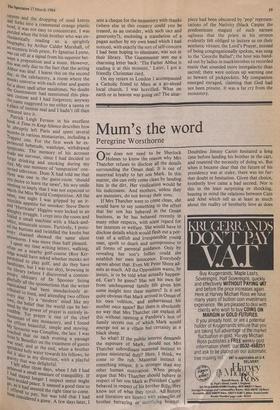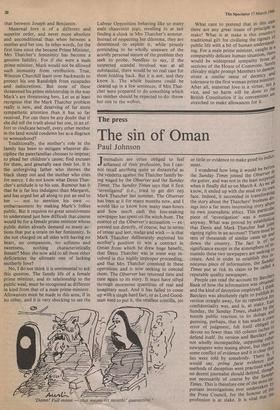Mum's the word
Peregrine Worsthorne
(\ne does not need to be Sherlock V Holmes to know the reason why Mrs Thatcher refuses to disclose all the details surrounding the Oman deal. It is out of maternal loyalty to her son Mark. In this matter, she can only come clean by landing him in the dirt. Her vindication would be his indictment. And mothers, unless they are monsters, do not betray their sons.
If Mrs Thatcher were to come clean, she would have to say something to the effect that her son has behaved in the Oman business, as he has behaved recently in many other respects, with scant regard for her interests or welfare. She would have to disclose details which would flesh out a por- trait of a selfish and irresponsible young man, spoilt to death and unresponsive to all forms of parental guidance. Only by revealing her son's follies could she establish her own innocence. Everybody agrees about that. Even Mr Peter Shore ad- mits as much. All the Opposition wants, he insists, is to be told what actually happen- ed. Can't he guess? Has not his own far from unchequered family life given him some insight into these matters? Is it not quite obvious that Mark arrived in Oman of his own volition, and embarrassed his mother once again? But there is absolutely no way that Mrs Thatcher can explain all this without opening a Pandora's box of family secrets out of which Mark would emerge not as a villain but certainly as a black sheep.
So what! If the public interest demands the exposure of Mark, should not Mrs Thatcher subordinate maternal instinct to prime ministerial duty? Here, I think, we come to the rub. Maternal instinct is something unique. It is stronger than any other human motivation. When people argue that Mrs Thatcher should behave in respect of her son Mark as President Carter behaved in respect of his brother Billy, they know not of what they speak. All history and literature are littered with examples of brother betraying or sacrificing brother.
Doubtless Jimmy Carter hesitated a long time before landing his brother in the cart, and resented the necessity of doing so. But when it became clear that the future of his presidency was at stake, there was no fur- ther doubt or hesitation. Given that choice, brotherly love came a bad second. Nor is this in the least surprising or shocking, bearing in mind the relations between Cain and Abel which tell us at least as much about the reality of brotherly love as does that between Joseph and Benjamin.
Maternal love is of a different and superior order, and never more absolute and unconditional than when between a mother and her son. In other words, for the first time since she became Prime Minister, Mrs Thatcher's femininity has become a genuine liability. For if she were a male prime minister, Mark would not be allowed such immunity from retribution. True, Winston Churchill leant over backwards to protect his son Randolph from escapades and indiscretions. But none of these threatened his prime ministership in the way Mark's are threatening hers. Let us at least recognise that the Mark Thatcher problem really is new, and deserving of far more sympathetic attention than it has so far received. For can there be any doubt that if she did tell the truth about her son, in an ef- fort to vindicate herself, every other mother in the land would condemn her as a disgrace to womanhood?
Traditionally, the mother's role in the family has been to mitigate whatever dis- cipline the paterfamilias chooses to impose; to plead her children's cause; find excuses for them, and generally ease their lot. It is the unforgiving father who throws the black sheep out and the mother who cries for mercy. I do not know what Denis That- cher's attidude is to his son. Rumour has it that he is far less indulgent than Margaret, and has urged her all along to put an end to her — not to mention his own embarrassment by making Mark's follies public. But it requires no great sensitiveness to understand just how difficult that course would be for a female prime minister whose public duties already demand so many ac- tions that put a strain on her femininity. Is she not charged on all sides with having no heart, no compassion, no softness and sweetness, nothing characteristically female? Must she now add to all these other deficiencies the ultimate one of lacking motherly love?
No, I do not think it is sentimental to ask this queston. The family life of a female prime minister, and its relationship to the public weal, must be recognised as different in kind from that of a male prime minister. Allowances must be made in this area, if in no other, and it is very shocking to see the Labour Opposition behaving like so many male chauvinist pigs, revelling in at last finding a chink in Mrs Thatcher's armour. Instead of respecting her dilemma, they are determined to exploit it, while piously pretending to be wholly unaware of the acutely personal nature of the problem they seek to probe. Needless to say, if the suspected scandal involved was at all substantial, there would be no real case for them holding back. But it is not, and they know it. The whole business could be cleared up in a few sentences, if Mrs That- cher were prepared to do something which no mother should be expected to do: throw her son to the wolves.
What cant to pretend that in this case there are any great issues of principle a: stake! What is at stake is this country s traditional gift for civilising the rigours of public life with a bit of human understand- ing. For a male prime minister, caught in a comparably delicate human situation, there would be widespread sympathy frmay sections of the House of Commons. chivalry might prompt Members to demon' strate a similar sense of decency and tolerance to the first woman prime minister. After all, maternal love is a virtue, not a vice, and no harm will be done to the British Constitution if its conventions are stretched to make allowances for it.















































 Previous page
Previous page